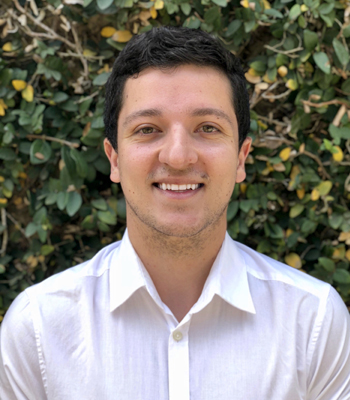Interview with Jacob Radparvar
UCSD Psychology BS ’18 with specialization in Cognitive Psychology, and Physiology and Neuroscience BS ’18, attending MD/MBA in Health Management Program, Tufts University School of Medicine
1. What did applying to graduate school involve?
Applying to medical school began as soon as I knew I wanted to be a medical doctor. It consisted of enrolling in pre-medical courses and excelling in them, joining one of the many exemplary research teams at UCSD or Scripps, shadowing clinicians to ensure the medical route is suitable, spending time helping better the community, and practicing hobbies to stay well-balanced. When ready to apply to medical school, all those activities need to be converted into
2. Can you provide a general timeline of how the application process went?
The medical school application process is a lengthy one, starting over a year before one
3. Were there any resources that you relied on that were especially helpful in the application process? Were there any persons that helped you especially?
The AAMC website has a ton of resources that assist with completing the primary application; additionally, it has tips for secondary applications and interviews as well. As far as essay writing goes, I was proactive in using my resources for feedback. I set up a few one-on-one appointments with The Writing + Critical Expression Hub to work on my personal statement. I also asked my peers, friends in medical school, older brother, and letter writers for feedback on my essays.
4. Did you have to be interviewed, and if so, what were the interviews like?
There were two types of interviews I encountered as a medical school applicant. The first was a standard interview where I met with either a faculty member or community physician, and we spoke about me, my application, and my drive to become a physician. This interview was either open or partially close filed, meaning they either had access to my entire application or my application minus grades and test scores. The second type of interview was what’s known as Multiple Mini Interviews (MMI). The MMI style consisted of 7,
5. Did you have to take any additional classes beyond those required for your major, in order to qualify for the programs you applied to?
The required courses vary between medical schools, with some beginning to only “recommend” courses. Regardless, as a student in the Biology Department [Ed note: Jacob double-majored in Psychology and Physiology and Neuroscience], the majority of the pre-medical classes fell within the scope of my major. Two classes that could be added to increase the number of medical schools one can apply to are Math 10C/20C and Chem 40C, as many medical schools want to see a full year of math and organic chemistry.
6. Are there any other tips that you would offer to students that are considering applying for the same programs that you applied (and were accepted) to?
The most valuable skill I would recommend is time management. If you are able to manage your time wisely, you will have a greater chance at succeeding in your courses, finding extracurricular activities to be a part of, and ultimately enjoying the success matriculation. For me, this meant creating a four-year plan that included both courses and extracurricular activities I wanted to be a part of, as well as being up-to-date and knowledgeable on what makes a good medical school applicant.
7. What would you attribute your success in graduate applications to?
I would attribute my success in the medical school application process to being proactive in working towards my goals and taking advantage of the tools around me, whether that be the writing hub, pre-medical staff, faculty, or knowledgeable peers.
